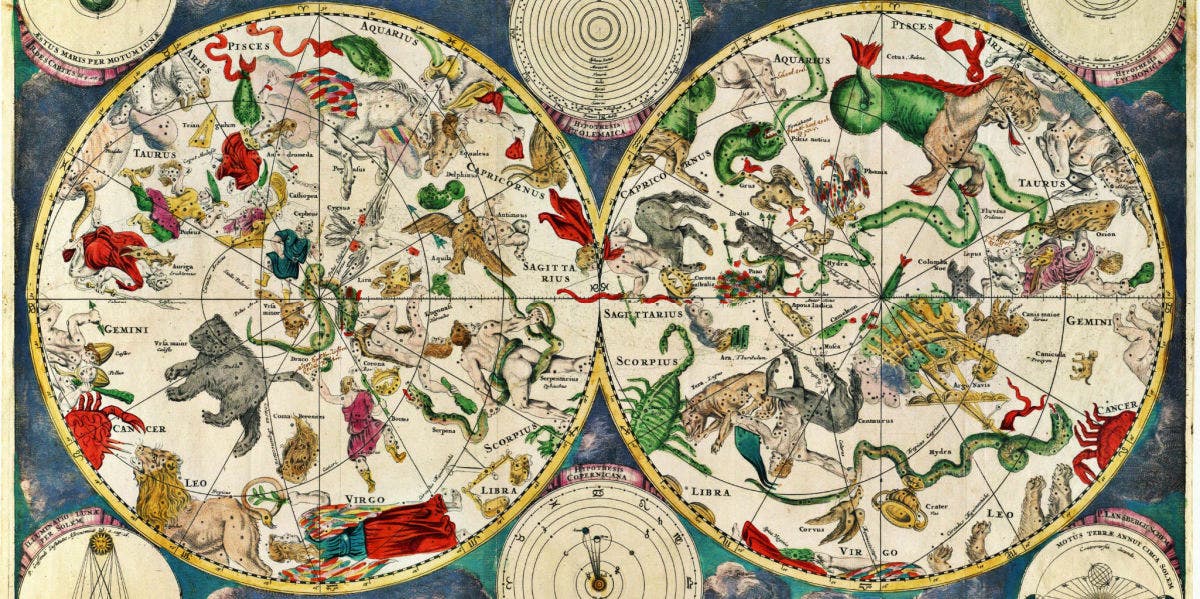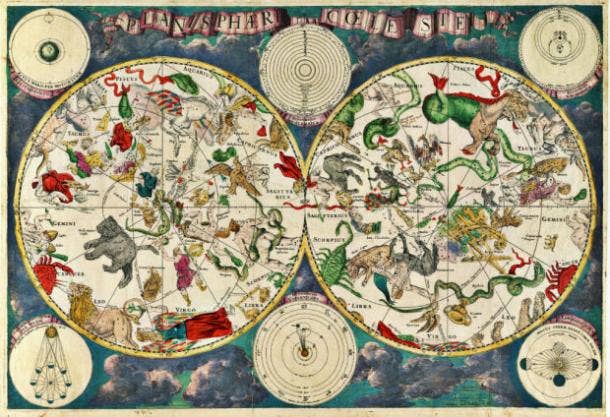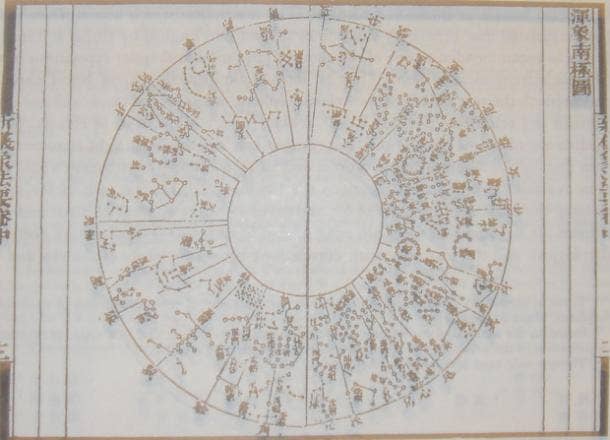
While they share many similar elements, they're very different.
By Nicole Bradley-Bernard — Last updated on Jul 15, 2022
Photo: Wikipedia / Public Domain

Ever read your horoscope? You might be someone who thinks astrology is true science, or perhaps you believe astronomy is the only thing that's real.
There are certainly some similarities between the two subjects, especially how similar the spellings are and the fact that they both have to do with what's going on in the sky. So it’s no wonder that some people get confused about the differences between astronomy vs. astrology.
Differences Between Astronomy vs. Astrology
Put simply, the most basic difference between astronomy vs. astrology is that astronomy is a science while astrology is considered a pseudoscience.
Astronomy is a natural science involving the study of the sun, moon, stars, planets, and other celestial or extraterrestrial objects and phenomena. People who study astronomy (astronomers) study space with research and observation based on the scientific method.
Astrology is not a science, but rather a type of divination — the practice of seeking knowledge of the future or the unknown by supernatural means — that happens to involve the forecasting or prediction of events through the observation and interpretation of many of those celestial bodies.
RELATED: 11 Astrologer Quotes That Explain What Astrology Is & How It Works
The Origins of Astrology
In ancient society, astrology was one of the original spiritual belief systems, as many people grew to believe that gods lived amongst the stars. In ancient China and India, intricate systems were developed to explain the positioning of the stars.
In the West, the practice originated in Mesopotamia around 1950 BC and spread throughout ancient Greece following the conquest of Asia by Alexander the Great.
Although it was considered part of mainstream science until the late 1600s, astrology is no longer considered scientifically reliable. Astrology is more akin to a system of beliefs rather than anything provable by the scientific method.
People who study astrology (astrologists) attempt to learn about how the way celestial bodies (namely the planets and the stars) move affects people and events on earth.
Some consider astrology to be a pseudoscience, while others claim that astrology is proven by evidence (even though the “evidence” is generally just based on subjective personal experience).
The Origins of Astronomy
Between 600 to 130 BC, the Greeks began transitioning away from religious astrology and towards more of a theoretical science that was primarily concerned with discovering the structure of the universe.
But astrology was still a common feature in the spiritual lives of people. It wasn’t until the 17th Century and the "Age of Reason" that astrology and astronomy became completely separate.
As the intellectual elite became more and more concerned with evidence and scientific research, astrology was reduced to mere superstition.
RELATED: 20 Words To Learn When Studying Astrology & Zodiac Signs
Facts About Astrology Vs. Astronomy
1. Both astronomy and astrology involve the universe.
People most likely get astronomy and astrology confused because they both study the same things, i.e., the solar system, the planets, the stars, and the way they move. They also both use similar tools, namely, star charts or star maps, such as the celestial map by the Dutch cartographer Frederik de Wit that dates back to 1670.
 By Frederik de Wit - Transferred from en.wikipedia to Commons. Scanned by Janke, Public Domain
By Frederik de Wit - Transferred from en.wikipedia to Commons. Scanned by Janke, Public Domain
Since an article published in 2017 reported that “58 percent of 18-to-24-year-old Americans believe astrology is scientific,” it seems like this is the time to set the record straight.
There are clear distinctions between the two and it’s important to know the difference. The easiest way is to remember that one is scientific and provable (astronomy), and the other is a belief (astrology).
2. Astronomy and astrology serve some common purposes.
Apart from the fact that they both study the objects in the sky, astronomy and astrology do share a common history.
Since ancient times, societies have looked to the sky to determine time and seasons. Historically, this was used to plant and harvest crops. Thus, studies about celestial bodies became a means of predicting the recurrence of events.
Ancient astrologists and astronomists used tools like sundials, such as the Indian Nadivalaya Yantra, pictured above, to track solar movements. Below is a picture of the world's oldest sundial (c. 1500 BC), found in Egypt's Valley of the Kings.
 Photo: University of Basel, Public domain, via Wikimedia Commons
Photo: University of Basel, Public domain, via Wikimedia Commons
Though we now have more scientific evidence that separates astrology and astronomy, they serve a similar purpose in tracking events and changes within our solar system, and both seek to improve our understanding of the universe.
3. Astronomy is fact-based while astrology is spiritual.
As mentioned earlier, astronomy is the scientific study of astrological objects, while astrology is more of a theoretical study of how these objects relate to the human experience.
Astronomy relies on fact-based research, and any speculations must be confirmed with evidence and science in order to be validated. Astrology, on the other hand, doesn’t seek to confirm all of its theories; in fact, doing so would take the fun out of it.
While astrology does use many factual elements such as planetary movements and star positioning, the beliefs drawn from these elements remain unconfirmed. Instead, astrology is used to connect humans with a more spiritual, inquisitive, and introspective experience than astronomy.
4. Cosmology is a branch of astronomy.
Just when you thought things were becoming clearer, here’s another planet-related-ology to throw into the mix.
Cosmology is the study of the origin and evolution of the universe. The most well-known and dominating aspect of this study is the Big Bang Theory (not the TV series), but cosmology also deals with the future of the universe, and how the planets may alter and evolve over time.
Cosmology bears vague similarities to astrology in that many of its predictions and theories remain unproven, but it is far more science-based and research-oriented than horoscopes and zodiac charts. Cosmology is technically a branch of astronomy, but it is so defined and large that it nearly exists in a scientific league of its own.
5. Astronomers may or may not believe in astrology.
The short answer to this is probably not. Astronomers typically look down on astrology since their study is based on years of detailed scientific methods and not ruled by feelings and assumptions.
But, as with any spiritual movement, it is possible to follow and benefit from a belief system without wholeheartedly placing your faith in it. That is to say that there are certainly astronomers out there who enjoy reading their horoscope from time to time, and setting new moon intentions once a month.
Shown below is a star chart of the south polar projection used for Chinese astronomer Su Song's celestial globe circa 1020–1101.
 By PericlesofAthens - Science and Civilization in China, Volume 3 by Joseph Needham, Public Domain
By PericlesofAthens - Science and Civilization in China, Volume 3 by Joseph Needham, Public Domain
RELATED: Here's How To Defend Your Belief In Astrology When People Say It's Fake
6. Astrologers use astronomy.
Again, we can’t generalize. But astrologers do, to an extent, need astronomy in order to have the basis for their beliefs. It is thanks to astronomy that we can continue to track stars and planets.
Related Stories From YourTango:
Astrologers can learn a lot from astronomy and use the facts gathered from this science to inform their understanding of the universe. Astrology is kind of like astronomy with some decorative sprinkles on top.
While astronomy stops at tangible evidence, astrology goes a little further and makes spiritual links between this evidence and human experience.
7. Astrology is more of an everyday hobby.
According to an article from 2018, astrology is making a comeback with the millennial generation. The article speculates that this is due to the fact that “people tend to turn to astrology in times of stress,” and millennials are known for being the most stressed-out generation.
Maybe the popularity of astrology stems from the mere human need to turn to your horoscope for comfort, or an excuse for your poor behavior. Maybe astrology is just a great source of entertainment for this generation.
Or, maybe more people really are just starting to believe in astrology and use it to make decisions.
The popularity of astrology is explained by the popularity of things like religion and faith, in general. In both cases, people need something to believe in.
We all want to feel like there is a purpose to this life and that everything happens for a reason. That everything in the universe is destined to be a certain way (so we can justify that things will “work out eventually”).
Astrology seems to fill that void in a world with so many problems.
RELATED: 5 Core Facts About Astrology You Should Know (Other Than Zodiac Signs & Horoscopes)
Nicole Bradley-Bernard is a writer with a Bachelor’s degree in Professional and Creative Writing. She works as a freelance writer for FINE Magazine and GreekRank.
